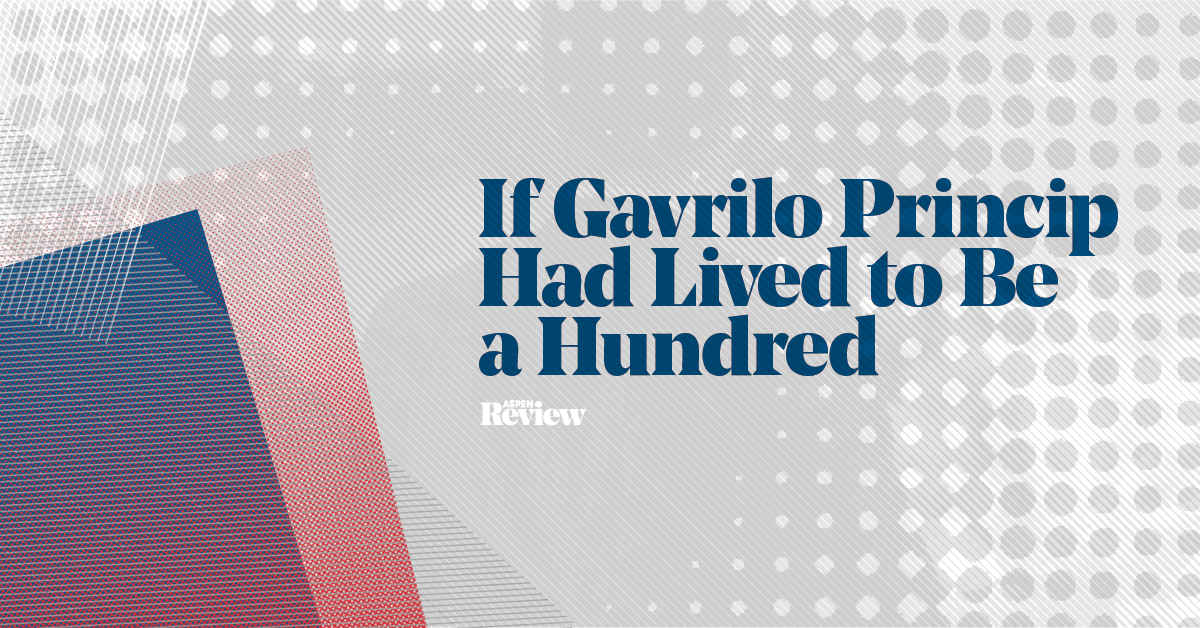April 1918 was one of the deadliest months of the World War I, as the Germans pursued their Spring Offensive to try to break through on the Western Front, in Belgium and northern France, before fresh American troops arrived to reinforce the armies of France and England. Unnoticed, on the other side of Europe, one twenty-three-year-old prisoner died on April 28 of tuberculosis in a fortress in the Czech lands, the very young man who had started the whole war by assassinating the Habsburg Archduke Franz Ferdinand and his wife at Sarajevo in 1914.
Gavrilo Princip, working with a team of young conspirators, was only nineteen when he pulled the trigger at Sarajevo, a teenager with a gun, as well as an ideology of extreme Serbian nationalism, deep political hatred of the ruling Habsburg dynasty, and probably some degree of adolescent mental imbalance. It was another nineteen-year-old who opened fire in Parkland, Florida, in February this year, murdering seventeen students at the high school from which he himself had been expelled.
Motivated by a Political Ideology
Princip (who had also been expelled from high school) was motivated by a political ideology, and supported by a secret society, the Black Hand, dedicated to violence and terror on behalf of Serbian national agenda, but one should not underestimate the chemical, emotional, and mental volatility of the adolescent male body and mind, and the compelling fantasy of silencing inner voices by ring a gun, in his case a Belgian semi-automatic pistol. He killed only two people in Sarajevo—the heir to the Habsburg throne and his wife—but the war that eventually ensued produced seventeen million more deaths over the next four years.
Born as a Bosnian Serbian subject of the Habsburg emperor in 1894, Princip hated the empire as the oppressor of the Serbian people, but the government that he despised was too civilized to allow for the capital punishment of a nineteen-year-old. He was imprisoned in the Habsburg fortress at Terezín, where he tried to kill himself, and then succumbed to tuberculosis before the end of the war that he had instigated. Terezín was a somewhat obscure military fortress during World War I, distant from the major battle fields, but during World War II, as Theresienstadt, it would become notorious as the concentration camp where the Nazis attempted to create the illusion that they were ghettoizing but not actually murdering the Jews of Central Europe. Terezín today is a concentration camp museum to the Jews who briefly created a community there before being deported to their deaths, and the death of Princip in that same place in 1918 has become an almost unnoticed coincidence of history.
Princip hated the empire as the oppressor of the Serbian people, but the government that he despised was too civilized to allow for the capital punishment of a nineteen-year-old.
If Princip had lived six more months, he would have been thrilled to witness the disintegration and extinction of the Habsburg empire he hated so much; he would have seen himself become a national hero in the newly emerging Yugoslav state. Regarded as a terrorist by the Habsburg government and its allies, and more generally as the reckless instigator of the most terrible war Europe had ever known till then, Princip, a teenager with a gun, posthumously achieved political ends that went far beyond what he might have imagined.
The End of a Relatively Liberal State
Josip Broz Tito, who was roughly Princip’s contemporary, continued to preside from Belgrade over a Yugoslav state sixty years after the assassin’s death. The youngest of the Sarajevo conspirators, Vaso Čubrilović, only seventeen at the time of the assassination, lived into his nineties, served as a minister in Tito’s government, and is supposed to have regretted in retrospect the murder of the archduke, commenting: “We destroyed a beautiful world that was lost forever due to the war that followed.” In fact, even the Habsburg state of Austria-Hungary—which Princip was not alone in regarding as oppressive—has come to be appreciated by historians as relatively liberal and even politically innovative in its efforts to encourage the coexistence of rivalrous nationalities. Certainly, in retrospect, it appears in a relatively favorable light compared to the various governments—including Nazi and Stalinist regimes—that have followed on the same terrain. If Princip had lived to be a hundred, he would have seen Yugoslavia itself disintegrate in national internecine violence—with resurgent Serbian nationalism playing a murderous role in the Bosnian civil war.
Princip did not live long enough to grow up and have regrets. He died on April 28, 1918, as World War I was raging on the Western front, when so many teenage boys were dying in the trenches. In the highly nationalist climate of present-day Serbia, a new bronze statue of Princip, forever young, was recently erected in Belgrade, with the president of Serbia saluting his memory: “Gavrilo Princip was a hero, a symbol of the idea of freedom, the assassin of tyrants, and the carrier of the European idea of liberation from slavery.” From outside Serbia we might view him rather differently, as a troubled kid who combined aspects of youthful political terrorism and teenage gun violence that continue to render our world unstable a hundred years after his death.


